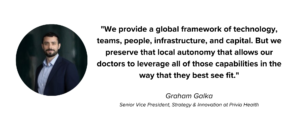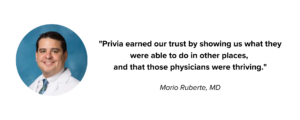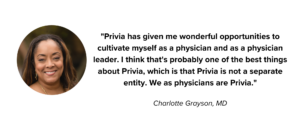All practices have unique challenges, goals, and starting points. For these reasons, healthcare partners should make sure their tools and services are as nimble and diverse as the providers they serve. By meeting providers where they are, we can thrive — together.
National Expertise With Local Support
Healthcare is “glocal” — meaning healthcare professionals typically execute the global tenets of healthcare locally. Doctors know their practices, communities, and patient bases best. Thus, the partner needs to scale their national offerings so they’re robust enough to support a large network but flexible enough to mold to each doctor’s unique style. There are several ways a partner can customize their support:
- Payer contracting & credentialing: It’s not enough to be well-versed in value-based care and fee-for-service contracts. Now, partners need to adjust their contracting services depending on where the providers are on their journey from volume to value.
- Revenue cycle management: Providing practices with inflexible RCM might help their workflow, but it also assumes control over their financial processes. Instead, consider an adaptive rev cycle team that supports a practice’s billing process but enables them to retain autonomy.
- Practice consulting: Providing skilled, knowledgeable practice operations consultants who develop relationships with physicians and staff is essential to identifying areas of opportunity, reviewing key performance indicators, and creating actionable success plans.
Does your healthcare partner offer individualized support by:
-
- Allowing you freedom and flexibility in your revenue cycle management?
- Working with you on a personalized plan for success in your practice?
- Providing the expertise and data you need to make informed decisions?

See how a partnership can help providers can save time and money on healthcare business solutions.
Enabling Autonomy
Roughly 51 percent of primary care physicians affiliate with health systems, and it’s only getting more difficult for doctors who want to remain — or start their careers — in independent practice. Supporting physician autonomy allows doctors to explore new treatments, pursue their passions, and fill critical leadership gaps. These activities support better care and improved patient outcomes.
Does your partner protect your autonomy by:
- Supporting you with the tools you need to do your best work?
- Connecting you with colleagues and providing networking opportunities?
- Helping you fortify your practice against industry headwinds?

See how you can utilize the support of a national network without sacrificing your autonomy.
Positioning Practices For the Future
Ironically, partners can set providers up for long-term success in value-based arrangements by assessing quick wins. To do this, they should build a foundation that combines the partner’s services with the practice’s current capabilities. Part of the foundation could be robust revenue cycle management services that help improve a practice’s collections.
Does your partner help set you up for long-term success by:
- Working with you on solutions to swiftly address, and eventually eliminate, your pain points?
- Developing a clear roadmap for how the partnership will support you, your practice, and the staff in the future?
- Clearly communicating what changes in healthcare policy would mean for you and your practice?

Check out our guide to see more tips for success in value-based care programs.
Prioritizing Physician Leadership
As leaders, physicians bring a unique perspective to the table by combining their clinical expertise, empathy for patients, and understanding of the broader healthcare landscape to develop informed solutions. Privia’s Physician-Organized Delivery groups (PODs) allow physicians to collaborate, share ideas, and implement best practices that can lead to better patient outcomes or new opportunities.
Does your partner support physician leadership by:
- Creating opportunities for you to have an active voice in the partnership?
- Soliciting your feedback to improve their products and services?
- Inviting you to join physician-led summits or conversations to encourage collaboration?

Read more about how cultivating physician leadership helps drive success.














Related Articles
How to Keep Your Patients From Skipping Mammograms
Kristin Schraa, MD, with Virginia Women’s Center shares how women’s health providers can encourage patients ...
3 Ways Healthcare Can Integrate Behavioral Health and Primary Care
Integrating behavioral health with primary care can lead to better patient outcomes — but how ...
How Can Physicians Support Postpartum Mental Health?
On average, 13 percent of mothers in the United States will develop symptoms of postpartum ...
Engaging Patients in Annual Mammograms
Studies show that a little over 66 percent of women aged 40 and older get ...
What Do Medicare-Aged Patients Want in Their Healthcare?
Within the next 20 years, 20 percent of Americans will be 65 or older. It ...
How Health Systems Grow Stronger With Privia Health
Discover how we helped Health First upgrade technology, align physicians, and accelerate toward value-based care. ...